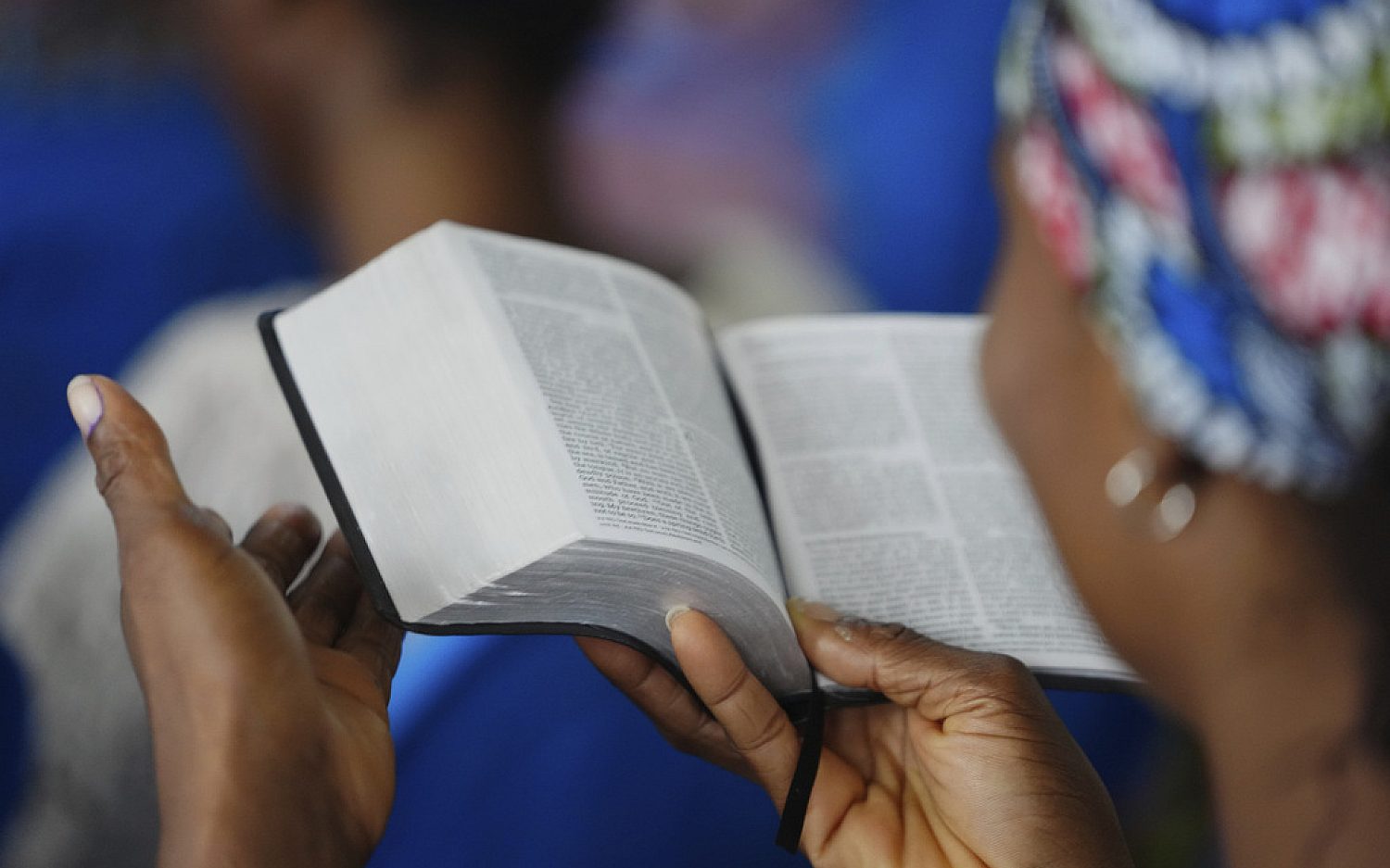Blood and the Bible
Heavy on gore and violence, The Book of Eli goes light on spiritual depth, as it tries hard not to be 'overtly Christian'
LOS ANGELES-In a post-apocalyptic landscape, a man walks alone down an empty road. With the ruins of a past civilization all around him, he is forced to fight for survival against the cruel and unforgiving terrain and the lawless and the violent desperation of his fellow man.
Sure, we've seen this movie before, but in The Book of Eli there's a difference. Our lone traveler, the Eli of the title (Denzel Washington), isn't on a journey to personal safety. He's on a mission from God, to carry the last surviving copy of a King James Bible west, to a place where it will be safe, and from which its message can spread.
I had the opportunity to interview Washington and co-director Allen Hughes last week, and found that Washington appears to care deeply about carrying the Bible into his daily life. He's on his third read-through of the Scriptures, and he told me that he never stops asking God to work in his life: "[Wisdom], there's something to work on. So I started praying on that and I said, 'God, give me a dose of that.' I mean, I can't get any more successful, but I can get better. I can learn to love more. I can learn to be more understanding. I can gain more wisdom."
Hughes, though, seems to have a different understanding, one that may have undermined the film-but more about that later.
It's a harsh world Eli walks through. A war (origins largely forgotten) ripped a hole in the atmosphere, allowing the sun's rays to scorch almost all life off the planet. Eli and other survivors wear dark goggles to protect their eyes and scavenge endlessly for water (the planet's most valuable commodity). Thieves, killers, and cannibals roam through barren wastelands that have few animals and no plants. (Eli seems to live on a diet of cats.)
The plot is classic simplicity: Eli arrives in a town and meets its ruler, a ruthless gangster named Carnegie (Gary Oldman), a man who realizes the significance of Eli's book-for Carnegie, like Eli, is a rare remaining reader. Part Mussolini, part Brigham Young, Carnegie wants to use the Bible to establish a religion with himself as patriarch, the better to consolidate his power and spread his influence to new territories. Carnegie tries to take the Bible by force, but Eli resists in a flurry of blood and bullets, and the chase is set.
There's not much more to the story. Beyond Eli and Carnegie, supporting characters Claudia (Jennifer Beals) and Solara (Mila Kunis), as Carnegie's concubine and adopted daughter, respectively, step forward only when some dialogue is needed to move the plot along. Ray Stevenson as Carnegie's strongman, Redridge, bristles menacingly in the background without ever seeming to know where to stand. During an otherwise pointless diversion, theater legend Michael Gambon does more in five minutes of screen time than the rest of the cast do in the entire movie, providing a glimpse of a cleverer film that could have been.
The Book of Eli garnered an R rating for "some brutal violence and language," and while the language mostly comes from Eli's enemies, Eli isn't afraid to dish out brutal violence through the use of guns, a bow and arrow, a razor-sharp machete, and a dizzying array of martial arts maneuvers used to gut, dismember, impale, and blast his opponents to kingdom come. Hughes and his co-director and twin brother, Albert, lovingly capture in detail every bone shard and blood spatter.
In short, Eli is really about only two things: blood and the Bible. It delivers on the quantity of blood, with the Hughes brothers providing so many bloody set pieces with slow motion and ear-popping sound that they blend together into an eminently forgettable bombastic blur. What's missing is creativity-except for one fight sequence filmed entirely in silhouette. The Book of Eli believes that more is always more, and suffers for it.
On the spiritual side, Christians used to seeing their faith portrayed as either a joke or a superstitious curiosity will be relieved to find Eli's faith dealt with respectfully and the Bible itself seen as a missing cornerstone of society that is worth cherishing. But the movie undermines itself by refusing to take any chances beyond that, and it ultimately settles for a universalistic ending that saps the film of any specific meaning.
Washington told me and other critics that he is uncomfortable with divisive doctrine: "We can get caught up in religion. I'm not so big on that word. 'I'm right, you're wrong.' . . . Fundamentally, all [scriptures] say, 'God is love.' That to me is the fundamental message."
In the same interview, though, Washington revealed how his faith has guided him throughout his career. While discussing the beliefs of the Eli character, Washington reflected on previous roles: "I've tried to bend even the worst of roles like Training Day. The first thing I wrote on my script was 'The wages of sin are death.' In the original script you found out that he died on television. I said, 'In order for me to justify him living in the worst way, he has to die in the worst way. I had [co-star Ethan Hawke] pull me out of the car and I crawled like a snake and the whole neighborhood turns their back on me and I get blown to bits."
Washington, whose father was a Pentecostal minister, wasn't the only actor affected by the faith portrayed in Eli. Gary Oldman, whose character wears saint's medallions owned by the actor, talked about faith's power: "Faith is such an incredible thing because you can't see it. You can't touch it. It's something that you have, and if it's strong, it's immovable. . . . It's an admirable thing. It's an enviable thing."
Allen Hughes offered, unintentionally, the best explanation of the film's failure to make a coherent statement about the issues it raises. He revealed an intentional decision to "make sure that people would come into this movie and whatever they're bringing in is what they're seeing." Hughes did not want to appear to be making an "overtly Christian" movie. "It's critical for me and my brother that [The Book of Eli] speak to everyone. It's a blessing for Christians that [the book] happens to be the Bible in this movie, because we show the positive, a righteous character, but at the end of the day I'd like the atheist to accept the blessing, [as well as] the Native American and the Buddhist."
Hughes went on to say, "There's a oneness that we all must embrace. . . . Let's just accept one another and [not] split hairs. . . . When I sit down with Denzel and his lovely wife, they're both Christians, [but] we never break into semantics."
Although Washington's faith shines through in his role, The Book of Eli, soaked in stylish gore, never provides enough depth to justify its excesses. The filmmakers desire to avoid challenging any viewer's preconceived notions means that only the squeamish will be offended.
An actual newsletter worth subscribing to instead of just a collection of links. —Adam
Sign up to receive The Sift email newsletter each weekday morning for the latest headlines from WORLD’s breaking news team.




Please wait while we load the latest comments...
Comments
Please register, subscribe, or log in to comment on this article.